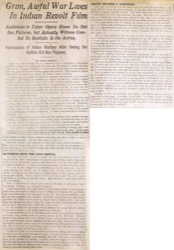Title: Grim, Awful War Lives In Indian Revolt Film
More metadata
Grim, Awful War Lives In Indian Revolt Film
Audiences in Tabor Opera House Do Not See Pictures, but Actually Witness Combat So Realistic Is the Acting.
Impressions of Indian Warfare After Seeing the Buffalo Bill War Pictures.
(By HUGH O'NEILL.)
There was the coughing bark of a Hotchkiss gun; a momentary white cloud of smoke curtained the gray landscape; then the first shell in a battle that had lasted for six dragging hours burst on the uneven hillside where five thousand red men were gathered in their last war against this country. They seemed to fall in scores under its splintering missiles like broken reeds in a storm.
A man near me sucked the breath in between clenched teeth and muttered "My God!" He twined and untwined his fingers convulsively. Another clapped his open hand across his mouth to stifle a sob. I heard somebody groan. There was a cackle of hysterical laughter. Then, of a sudden, there fell the silence that only touches the living world when Death is abroad on His business with the implements of wholesale devastation. The echo of an old, forgotten Nunc Dimittis seemed to float pityingly across the listening plains. For a moment we watched the dead and forgot the battle.
On the opposite hills, the cavalry lay dismounted wherever they could find cover. Their carbines had been pitting the air with patches of smoke all the morning. The rattle of the firing was like rain falling on a tin roof. Sometimes a bugle blared and men galloped through the defiles on errands of mystery. A red man, feathered like some foolish fowl, rushed from the midst of his people and waved his gun, shrieking incoherently. A bullet found him and he fell like a shot bird.
The Indians backed up against the hills and fighting with a pathetic courage, yelled to each other and taunted the reaching fingers of Death and fired at anything that moved and only paused when the Hotchkiss coughed again and another shell came [...?] that the day of hand-to-hand fighting was ended.
Ever since the rippling, snow-whipped dawn it had been a running fight, with our cavalry on one side of the ravine and the Indians on the other. In the early afternoon we turned their flank and cut off their retreat. They seemed to realize as we worked in closer on them everywhere that they had either to fight on where they were or surrender. And they had chosen to fight on.
From the opening of the battle it was clear that brains, ordered movements, a higher type of courage were on our side. On theirs was the lust of carnage and hearts that knew no fear and the frenzy that yelled defiance at the echoing gun shots from the indifferent hills.
HOTCHKISS ENDS THE LONG BATTLE.
But when they could retreat no further and lay stark before us against the hillside and the officer commanding drew back his skirmish line and the Hotchkiss lifted its snout and grunted death at them with every shell, the fight that might have lasted another day was being shortened every minute by their increasing dead.
We were in close enough to the Hotchkiss to feel the acrid gases from its smoke stinging our nostrils. As the firing of the carbines ceased and the air cleared we could see the little mounds of dead heaped by the bursting shells on the opposite hillside. Massed together in that way they looked like tents, struck and about to be folded for another march. And each time a shell burst another tent was struck.
From a battle between men it had become an afternoon of methodical, wholesale killing. I heard a man praying in whispers.
Across there in the gray light, with the snow falling thicker, as the sun was going down, those Indians stood out on the hillside to be butchered by our Hotchkiss as no white troops had ever stood in any war. We had them against a wall and we were pounding them to pieces. Sometimes they formed and came charging down the hillside to the ravine as though thus to hasten death. And each time they charged our gunner found the range and they halted and spun round and fell as a stone falls when a shell burst above them.
It was romantic war no longer with its stimulus to courage and its marvels of personal prowess; it was killing reduced to a business.
Protected by the fire of the Hotchkiss some scattered companies of dismounted cavalry were working down the ravine and up on the other side. Between them and the Indians there was a stretch of open country, dotted here and there by the dead who had run out charging from the main body. On the left flank of the Indians we saw several troops of our mounted men ride across the crest of a hill. Then everywhere the battle began again and on every side the poor red men were being crowded and broken by our fire.
A high wind came up from the north and drove the cutting snow in the faces of those of us who merely watched the fight. A troop of cavalry swung past at the trot and an ambulance went bumping down the ruts of the road where a patch of us wounded lay waiting. A soldier with two fingers of his left hand about off came running toward us shouting that it was all damned foolishness. On the hills the sound of carbines firing echoed in a steady, patient way with the sound of hammers driving coffin nails.
DEATH BECOMES A MONOTONY.
The snow fell thicker and the smoke hung low over the land and we were filled with the heavy monotony of death. It was like some nightmare that we had been weeping in through eternity. The whole world was involved in conflict. A man gritted his teeth and muttered, "My God! Why don't they surrender?" and, as if answering him, the bugles, turned to pity, sang "cease firing," and a kind silence fell in where death and turmoil had been keeping bloody house all day.
The smoke drifted from the hillside and plains across where we watched; a group of Indians came stalking down the hill pacing to the funeral of a defeated race; our flag fluttered red and blue and white across the dead gray of the earth and skies; there was a cheer and the sound of tramping feet and the blare of loud music —
And we were recalled to the fact that we were sitting in the Tabor Opera house looking at the moving picture reproduction of the last fight of the Indians of North America against the army of the United States. Hillsides, plains, the moving troops, the dying Indians, the coughing Hotchkiss were no more. Instead there were the lights of the theater and the white screen and a thousand people awaking to the realization of having witnessed the most wonderful spectacle ever produced since moving pictures were invented.
There was nothing "theatrical" about this production. The officers and the cavalrymen and the Indians are not actors mindful all the time of the camera and automatic in the "registration" of their emotions.
They are, instead, the officers and the men of the army of the United States. They were in that war which we have just seen re-enacted. The Indians are not the hired players of some film company; they are the Indians of Pine Ridge agency who made thus their last fight for freedom at this battle of Wounded Knee.
They go about their business as we see them unmindful of everything but the grim business they are on. And their fight along those miles of barren plains and beetling hills has been put into a moving picture so faithfully and wonderfully that — when it is finished and the flag floats in the winds — your pulse is still thumping and your throat is still dry from the acrid powder fumes and your eyes are not guiltless of the tears that came when the poor, foolish red men stood out on that last hill and the Hotchkiss coughed at them its pitiless message of death.
Nothing like this has ever been done before. Nothing to equal it will, perhaps, ever be done again. It is not a "photo play." It is not a series of "staged spectacles." It is War itself; grim, unpitying and terrible; and it holds your heart still as you watch it and leaves you, in the end, amazed and spellbound at the courage and the folly of mankind.
Title: Grim, Awful War Lives In Indian Revolt Film
Source: McCracken Research Library, Buffalo Bill Center of the West, William F. "Buffalo Bill" Cody Collection, MS6, OS Box 50, page 33
Topics: Buffalo Bill on Film
People: O'Neill, Hugh
Places: Tabor Opera House Pine Ridge (S. D.) Wounded Knee (S. D.)
Editorial Statement | Conditions of Use
TEI encoded XML: View wfc.nsp11356.xml
Back to top
